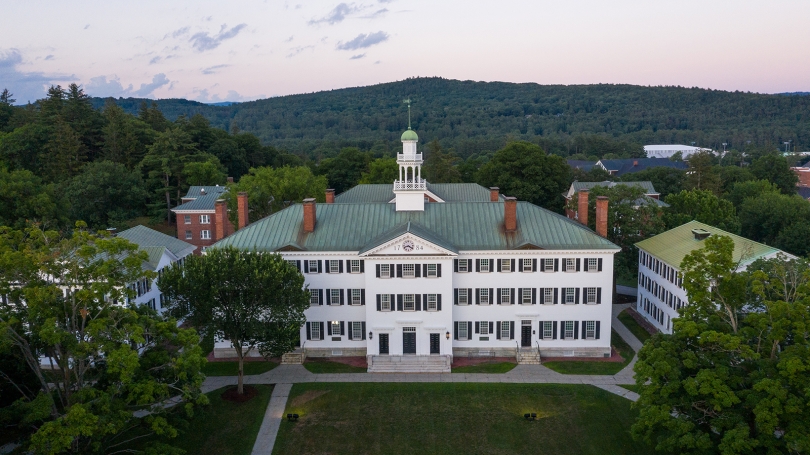
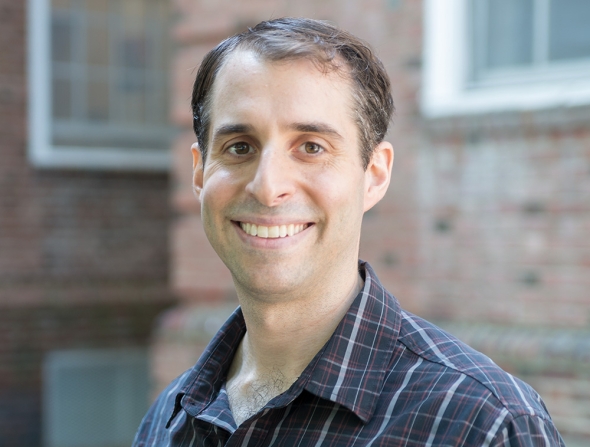
Arts and Sciences faculty members recognized for outstanding achievement in 2020.
Fourteen members of the Faculty of Arts and Sciences have been recognized for exceptional achievement in scholarship, teaching, and mentoring for 2020.
The awards, announced annually by the Office of the Dean of Faculty of Arts and Sciences, include the Jerome Goldstein Award for Distinguished Teaching, which is given based on feedback from students. The other awardees were selected by the associate deans of the four arts and sciences divisions.
"These scholar-teachers represent the liberal arts ideal that is at the core of a Dartmouth education," says Dean of the Faculty of Arts and Sciences Elizabeth Smith. "Their commitment to teaching and their passion for scholarship makes their work in the classroom, laboratory, and studio the launching point for their students' lifelong learning and leadership."
See a list of faculty awards at the professional and graduate schools.
Dartmouth News recently asked each of the Faculty of Arts and Sciences awardees to describe their teaching and research. Here's what they said.

I primarily study American voting behavior, campaigns, and elections. Never before have scholars such as I been so interested in Russia, given allegations of election interference. Further, the U.S. seems to be moving toward a new, multipolar Cold War where polarized political parties focus on different adversaries. Republicans look to China as a chief rival, while Democrats look to Russia. In such a complicated world where simple misunderstandings or mis-ascribed motivations can lead to deadly consequences, the value of experiential learning worldwide cannot be overstated.
I am happy to be part of an institution that understands the importance of these opportunities. Working with my department, and the Department of Russian, the Irving Institute for Energy and Society, and the Guarini Institute for International Education, we have designed a new off-campus program in Russia that allows students to study in-depth in Moscow and St. Petersburg followed by a train trip through much of the expanse of the Russian state. These experiences will give our future leaders a greater understanding of foreign peoples who have their own ways of thinking. We stand a better chance of enjoying world peace and understanding when institutions such as Dartmouth carry out their important educational missions.
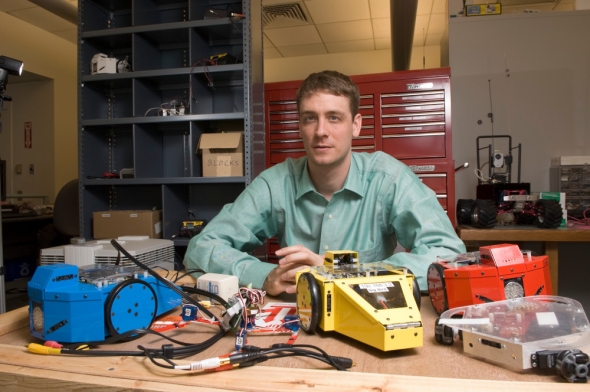
I'm interested in robot designs and motion. One current project studies how robots might teach sign language or swimming to humans. In another project, we aim to use robots to construct underwater structures. We imagine such robots eventually building seawalls to protect shorelines from coastal weather events, or substrate to help damaged coral reefs regrow. Past research highlights include exact time-optimal motion for mobile robots, robot origami, knot-tying, and laundry folding.
I love introducing students to computer science and robotics for the first time. I try to be thoughtful, humble, and kind. I also ask my students to work hard—first to master the foundations, and then to explore the frontiers of research. The reward is watching students explore ideas I could never have imagined, ranging from deviously clever robot hardware to beautiful mathematical proofs about the limits and possibilities of robot action.
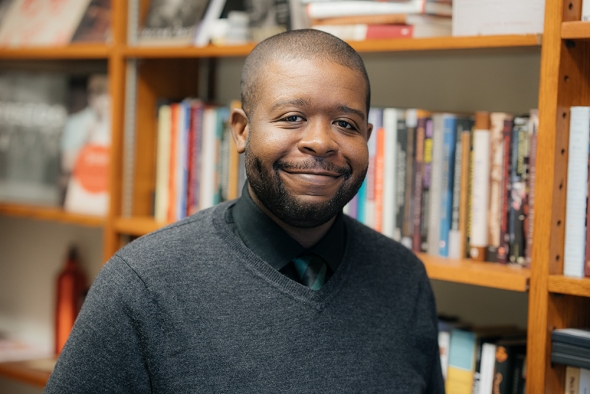
My courses focus on American religious history and African American studies. I help Dartmouth students understand that the concepts of racial identity and religious belonging have never remained unchanging in American history. To comprehend religion and race, informed students must account for their histories of nuance and particularity, according to region, age, class, gender, sexuality, ethnicity, and enslaved/free/citizenship status.
I specialize in 20th-century African American religious history, and my first book, Lift Every Voice and Swing: Black Musicians and Religious Culture in the Jazz Century (NYU Press, 2020), focuses on Cab Calloway, Duke Ellington, Ella Fitzgerald, and Mary Lou Williams' expressions of belief, practice, and unconventional positions of authority in Black religious culture. My current research defines "irreverent" religious humor by centering African Americans who express and sustain theological commitments while avoiding, opposing, or subverting the norms of reverential religious behavior—especially deference to religious authority.
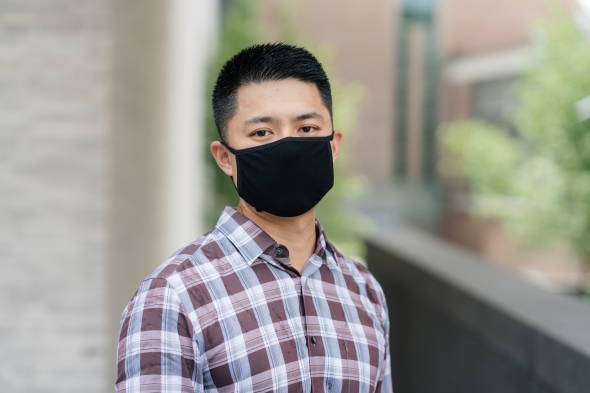
I work at the intersections of sound and justice. By lending an ear to imperatives of care and accessibility, I engage urgent questions about the vulnerability, solidarity, and survivability of humans and humanity in late-capitalist environments. My research asks how music and musicians can help us answer some of these questions. And I pose these questions to my students, who have, over the years, reciprocally taught me how to build a transparent and compassionate classroom.
Whether I am facilitating a course on video games, cancel culture, or protest songs, I emphasize collective listening as ethical practice. Among my favorite moments during any class are the so-called awkward silences—say, when there is a sudden lull in conversation, or when no one volunteers to answer a particular question. I invite students to hear such silence and to contemplate their relationship to it. I task them with locating wisdom in things people say, and in things left unsaid.
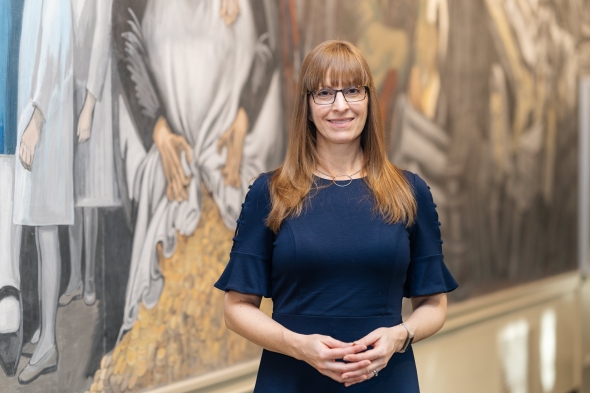
I am an art historian whose research focus is Mexican muralism. At Dartmouth, I am the resident expert on Jose Clemente Orozco's mural, The Epic of American Civilization. Like Orozco, I explore the historical construction of U.S. America through its entanglements with Latin America. In that respect, I seek to understand how U.S.-based, ethnocentric narratives of "American" history contribute to the exclusion of Latino/a/x histories and experiences from our national imaginary.
In the classroom I teach courses on U.S. American and Latin American art, and my goal is always to raise questions rather than to foreclose them with simplistic narratives. Over my career at Dartmouth, I have developed an experience-based pedagogy that involves students in the creation of knowledge. Their projects and perspectives have, in turn, reshaped my teaching and research. I believe that unlearning is a part of all learning, and that my students teach me as much as I teach them.
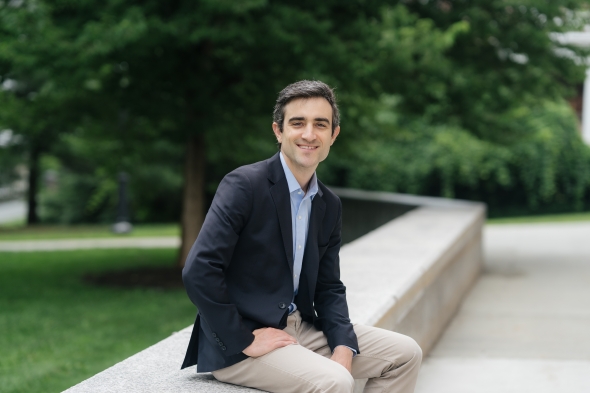
I study U.S. foreign policy. I'm particularly interested in understanding how foreign policy choices are made, how those processes can be improved, and what that says about the nature and limits of high-stakes decision making more generally.
One of the main challenges in this field is that the most important elements of foreign policy decisions also tend to be the most subjective. For example, there's almost never a clear "right answer" when it comes to defining the national interest or estimating the chances that a foreign policy proposal will succeed. How should decision-makers handle those analytic issues? What should they do when reasonable people disagree? I try to teach this material in a way that deepens students' knowledge of world politics while also building broader skills for approaching high-stakes decisions throughout students' lives and careers.
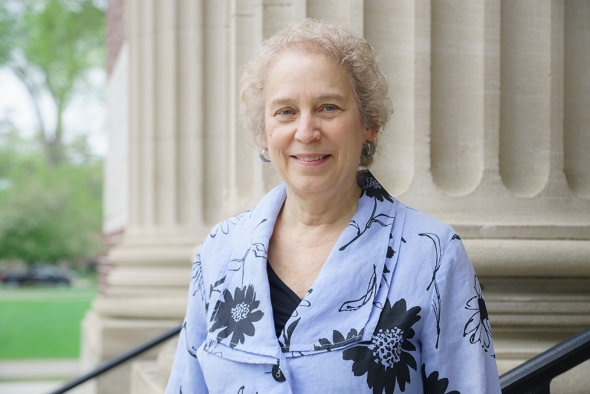
I teach and write about French literature and film. I try to help students acquire the critical skills and moral imagination that fiction teaches. I invite them to adopt—if only briefly—the worldview of a Jewish teenage runaway during the German occupation, a colonial sheriff in pre-independence West Africa who begins to doubt his mission, a 19th-century orphan who moves to Paris in search of work. I especially value teaching in our programs in France, where students can test their understanding in daily conversations with host families.
I'm currently researching works that are adaptations from one medium to another and that also portray characters who migrate from one culture to another and must "adapt" to their new environment. I'm hoping these two meanings will intersect in useful ways. Marcel Proust remarked that "The real voyage of discovery consists not in seeking new landscapes, but in having new eyes." I love teaching Dartmouth undergraduates—they're smart and curious and hard-working, and most of them are headed for careers outside academia, where I hope they will take with them the "new eyes" and multiple perspectives they've discovered in their humanities courses.
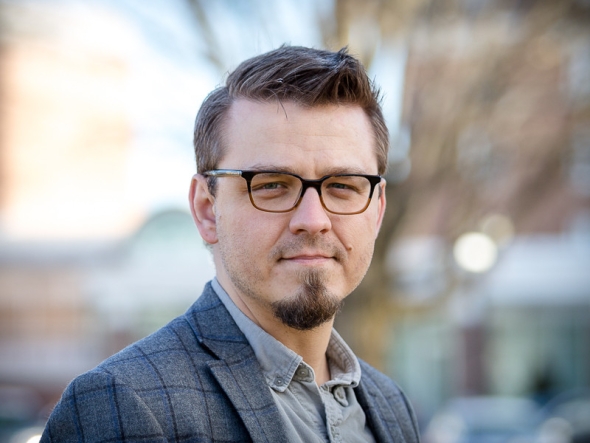
My main area of research is computer graphics, specifically the problem of rendering photorealistic computer-generated images. Most of us are familiar with the incredible computer-generated images we see in visual effects and animated films, but what is not immediately obvious is that creating those images involves complex physics simulations of light.
One aspect of my research is coming up with more efficient ways to mathematically model and simulate this physics. This naturally brings strong connections to applied mathematics and physics. For instance, the simulation techniques we've developed to render CG clouds are essentially the same as those used to test the safety of nuclear reactors. Unlike in computational physics, however, our simulations are typically not used by physicists, but by artists. My research therefore acts as a bridge between art, applied math, and physics, and I find this overlap incredibly fascinating and rewarding. I also try to let my enthusiasm for this overlap guide my teaching. As a visual learner myself, I use computer graphics to help me teach otherwise abstract mathematical concepts in a more accessible and visual way.
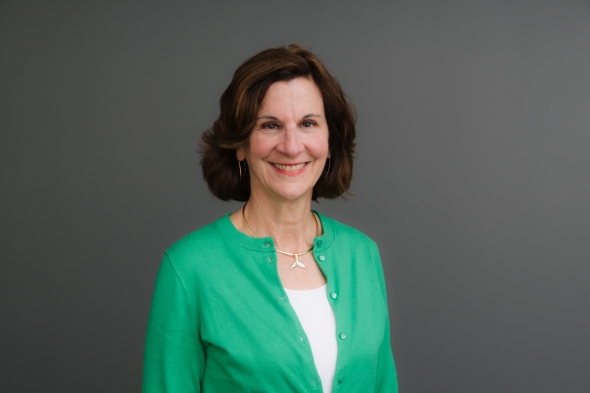
Globalization is one of the most powerful forces shaping our world. As an international economist, I study economic linkages among countries and how they shape economic outcomes and policy choices. The world has experienced tremendous growth in the cross-border movement of goods, capital, people, and ideas. Yet globalization has also brought risks and backlash. Much of my research has focused on why certain countries suffer currency crises, banking crises and/or sovereign debt crises, why these crises are so economically and politically costly, and whether they can be predicted or prevented.
I love helping my students develop a better understanding of the economic interactions among countries. My aim is to sharpen their critical thinking skills, guide them as they collaborate on open-ended problems, and support them as they conduct their own data-driven research on pressing international economic issues. I hope I have imparted my enthusiasm for international economics to my students and they have gained a lifetime appreciation for the role of economics in our interdependent world.
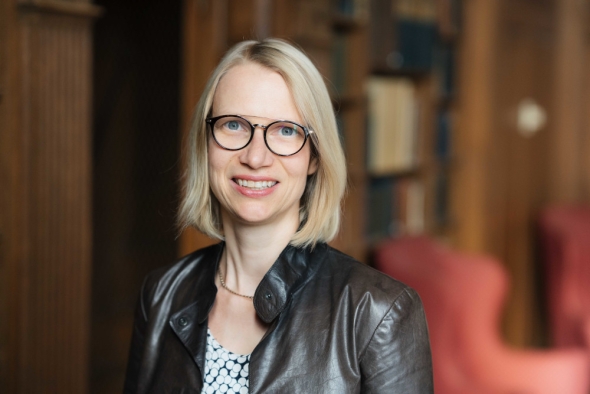
I am a media historian and scholar of German literature of the 19th century, and I specialize in material histories of creativity and knowledge production. Broadly speaking, I investigate what writers do with media technologies, and what media technologies do with writers—it makes a big difference for the creative process whether you put your ideas down in a notebook, on a typewriter, or in a database.
My current book project explores the writing practices and media technologies that 19th-century journalists in the U.S., England, and Germany used in the production of fake news. At the time, fakery was very common; journalists routinely feigned the eyewitness perspective, manipulated images, and fabricated quotations. Their motives, however, were often very sincere, and they honestly believed that there was such a thing as "good fakery," which is completely counterintuitive from today's perspective. I love bringing these counterintuitive discoveries from my research into the classroom. It's a great way to get a discussion started that makes the sparks fly and to introduce some much-needed critical distance to the media landscape of our own time.
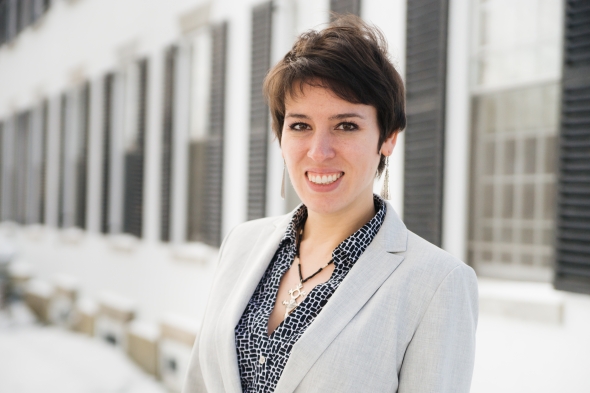
My work in linguistics centers on the documentation of endangered and unwritten languages, primarily in West Africa. I seek to uncover the complex rules and patterns that make up the grammar while documenting the speech practices of the community through their oral history, music, and verbal arts. This work is like a logic puzzle—you have to figure out how the pieces fit together—but at the same time it is deeply human, fostering connections with people all over the world through the shared experience of language. My next project focuses on "musical surrogate languages," traditions like talking drums where speech gets encoded on musical instruments through their notes and rhythms.
In 2018, I co-taught a course with Ted Levin (music) called "The Language-Music Connection," where students were able to learn one such tradition firsthand with a xylophone musician from Burkina Faso. Being able to share this passion with Dartmouth's brilliant undergraduates in the classroom and in the field is a major source of inspiration, and I look forward to continuing these collaborations in the coming years.
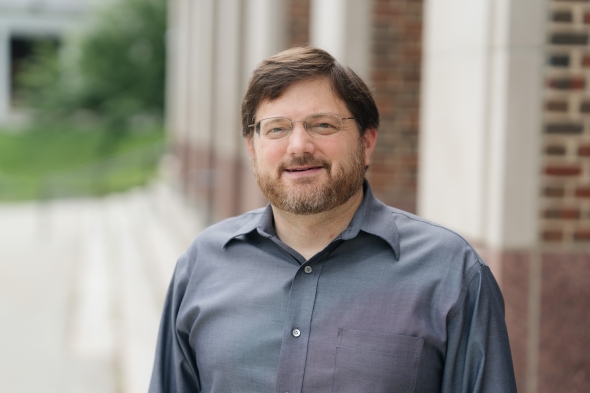
As a sociolinguist, my research focuses on the fascinating intersection of language and society. This area of study includes quantitative, computational, and acoustic phonetic analyses of regional and social dialect features, along with many other aspects of language variation and change in the context of human society. I collaborate in this research with underrepresented Indigenous language communities in East and Southeast Asia and around the world, where we explore dialect contact, acoustic sociophonetics, tone languages, gender, clan exogamy, kinship and social identity, child dialect acquisition, dialect geography, urban dialectology, and rural dialectology.
Here in New Hampshire, students and I have been conducting large-scale projects on English dialect features all around New England, including hundreds of fieldwork interviews and online audio recordings. Dartmouth undergraduate students have been my colleagues in all aspects of fieldwork, data analysis, conference presentations, and co-authored publications.
20200719_voight_0002.jpg
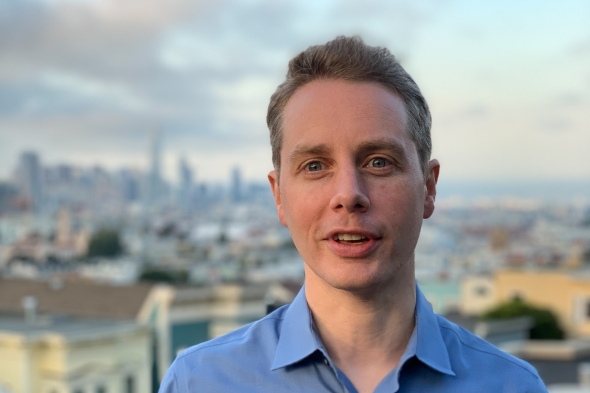
"Well, papa, can you multiply triplets?"—so the young sons of Sir William Rowan Hamilton would ask their father at breakfast. At last in October 1843, Hamilton had a flash of insight: a fourth dimension was needed. His discovery of the quaternions was a defining moment in the history of algebra, and to this day the quantities he symbolically denoted i, j, k are familiar to any student of multivariable calculus. Quaternion algebras represent rotations in three-dimensional space, and so they remain essential in applications like attitude control of spacecraft and computer graphics.
In my research, I study a more abstract notion of quaternion algebras, weaving together geometry and number theory with a focus on computational aspects. Having recently finished a graduate textbook on the subject, I am reminded how research and teaching are congruent objectives: Even at the frontier of discovery with my students and postdocs, we still learn from each other. One of my goals as an educator is to counter the reputation of mathematics as being a difficult subject. I try to make it intuitive, attainable, and inviting—whether in the classroom, on the page, or over breakfast.
wheelan_0351_cdt_katrina_wheelan.jpg
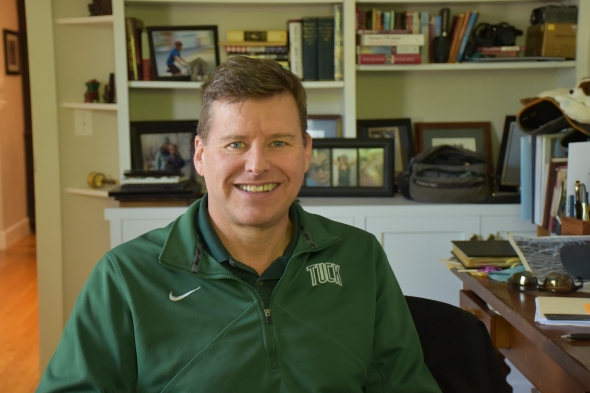
When I began teaching, I did an inventory of courses that I had taken as a student: Which classes had stuck with me? Which ones faded away quickly? What I realized is that the classes with permanent impact forced me to internalize the material. I did not just memorize terms and concepts for an exam; my whole worldview was affected. "Education 20" at Dartmouth exposed me to the inequities of the American public education system. Language Study Abroad dropped me into a different culture. Professor Starzinger's Supreme Court course made me appreciate the deep philosophical disagreements lurking beneath every case that reaches the high court.
As a professor, I've tried to focus on developing classes that will stick with my students. There are lots of ways to do that: travel, group projects, great books, discussions that tie the material to contemporary issues. Often I will say explicitly, "This is what I want you to remember at your 10th reunion."
In addition to the arts and sciences awards, the following faculty members have received awards this year from the professional and graduate schools.
Geisel School of Medicine: Laura Baumann, Thomas P. Almy Housestaff Teaching Award; Albee Bundnitz, C. Everett Koop, MD, Courage Award for Faculty; John Dick III, Joseph F. O'Donnell Faculty Award; Kathryn Kirkland, The Leonard Tow Humanism In Medicine for Faculty; L. Campbell Levy, Clinical Science Teaching Award and the Ann J. Davis Faculty Award; Virginia Lyons, Basic Science Teaching Award; Sandra Wong, Dartmouth-Mosenthal Surgical Society Fellow.
Geisel School of Medicine Departmental Clerkship Awards for Outstanding Contribution to Geisel Student Learning: James Ames, Department of Surgery; Joel Bradley, Department of Medicine Inpatient; Lisa A. DiBrigida, Department of Pediatrics—Outpatient ; Heather Feltmate, Department of Obstetrics and Gynecology; Oliver Herfort, Advanced Ambulatory Medicine; Samantha House, Department of Pediatrics—Inpatient; Scott Jaynes, Department of Community and Family Medicine; Andrew Smith, Department of Neurology; Stephanie Wilson, Department of Psychiatry.
Guarini School of Graduate and Advanced Studies: Evan Dethier, Guarini School Teaching Award.
Thayer School of Engineering: Doug Van Citters, Outstanding Service Award for Faculty; Lee Lynd, Thayer Distinguished Research Award for Faculty; Eugene Korsunskiy, Woodhouse Excellence in Teaching Award.
Tuck School of Business: Ramon Lecuona, Tuck Teaching Excellence Award; John Lynch, Tuck Teaching Excellence Award.
William Platt can be reached at william.c.platt@dartmouth.edu.